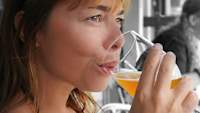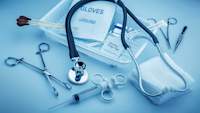无论你刚刚被诊断或担心,你可以有乳癌,你可能紧张,困惑,绝对惊。这是正常的,每个人都特色在HealthCentral与大病感觉就像你现在要做的。但是,我们和他们,在这里为您服务。On this page alone, you’ll discover not only the realities and challenges of the condition, but also the best treatments, helpful lifestyle changes, wisdom from people who have been where you are now, and all the critical information you need to help you not just manage—but thrive. We’re sure you’ve got a lot of questions...and we’re here to answer them.
Our Pro Panel乳腺癌
我们去了一些国家的顶尖专家,在乳腺癌给你带来最先进的最新信息成为可能。

P. Hank Schmidt, M.D.Breast Surgical Oncologist

Jonathan Stegall, M.D.Medical Director

扎西米特里,医学博士乳腺癌肿瘤科
What Is Breast Cancer, Exactly?
If you have boobs or know someone who does, you likely know some of the breast-cancer basics because there’s a darn good chance there’s a person in your life who’s had it. Breast cancer is the most common malignancy in women—about 270,000 cases are diagnosed each year—accounting for approximately 30% of all cancer cases, according to the American Cancer Society. Although it happens much less often, men can also develop breast cancer. In fact, Beyonce’s dad recently became one of the 2,670 men diagnosed annually.
In each of these people, their breast cancer began the same way: A rogue cell began to multiply in ways it’s not supposed to, eventually forming a tumor. To really understand the different types and stages of breast cancer, it helps to have an image in your mind of where it starts and how it grows. The main structures of the breast are milk glands (called lobules), the ducts that carry milk, and fatty and fibrous tissue that make up most of the breast. Most breast cancers start in the glands or ducts.
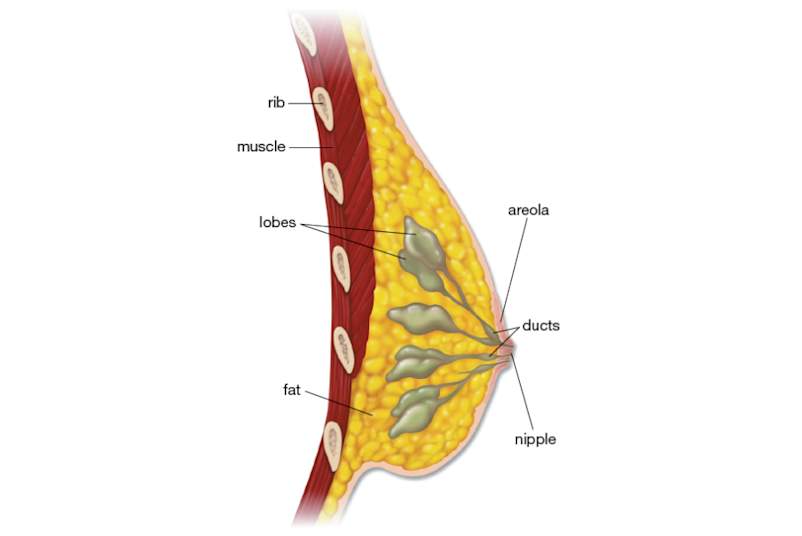
Once breast cancer is found, doctors will give it a stage—from 0 to IV—depending on the extent of the disease, what the prognosis is, and which treatments will work best. Within each stage, there are further classifications depending on things like tumor size and lymph-node involvement, usually indicated by doctors with the letters a, b, and c. For now, we’re sticking with the main categories:
Stage 0:原位也称为导管癌(DCIS),0期肿瘤是异常细胞,其形式在管道内(“原位”剩余到位装置),和目前的研究表明,在很多情况下,这些细胞不会生长的任何进一步或原因问题的病人。有人甚至认为DCIS癌前病变的这种非侵入性的形式。
The catch? About 20% to 30% of the time, these cells continue their out-of-control ways and push into tissues outside of the duct (this is called “invasive” cancer). Unfortunately, there is no sure way to know which type of DCIS you have, which is why even stage 0 breast cancers are treated (more on this below).
Stage I:This is the earliest possible stage of invasive breast cancer. At this point, the tumor isn’t bigger than 20 millimeters (2 cm) and and hasn’t spread more than microscopically to underarm lymph nodes. Cancers caught at this stage are curable and treatable: The five-year survival rate—meaning, the number of women who are alive five years after diagnosis—is an incredible 99%.
Stage II:These tumors are really trying to stake their claim. They’re generally larger than 20 mm and may have spread into a few lymph nodes under the arm. But deep breath. The five-year survival rate for stage II cancer is a still a reassuring 85%.
Stage III:At this point, the tumor is likely pretty big (larger than 50 mm) and/or cancer cells have made their way into several lymph nodes, either under the arms or as far away as the collarbone. This stage also includes cancers that have directly invaded the chest wall or have formed skin nodules or ulceration.
Stage IV:This most advanced form of breast cancer, known as metastatic, has spread to the bones and/or organs, such as lungs, liver, or brain. The most difficult part about this diagnosis is that it’s not considered curable. However, in some people, progression of the disease can be slowed or even stopped by a series of medications and other treatment, and the disease becomes more of a chronic illness. The five-year for this stage is 27%, which we know isn’t easy to see, but here’s what you must remember about these stats: Yes, they are scary, butyou are not a number。There are women alive today who have been living with metastatic breast cancer for decades.
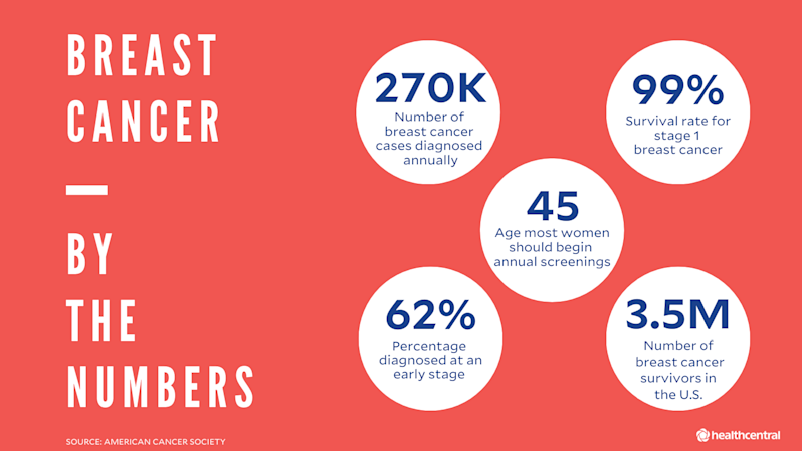
不太常见的癌症和其他乳腺疾病
Worth noting: The above describes the most common breast cancers, but there are afew less-common types你应该知道,而且有时与乳腺癌混淆其他一些乳腺疾病。
- Paget病:This rare breast cancer starts in the milk ducts and then spreads to the skin of the nipple and areola. It can look like an eczema rash.
- 炎性乳腺癌:In these cases, the cancer is typically more advanced, according to the National Cancer Institute, and has spread to the skin of the breast, making it red, swollen, and sometimes dimpled like the skin of an orange. With IBC, you may not always feel a lump, and it tends to be more common in younger women and those who are African-American.
- Lobular carcinoma in situ:Despite the word “carcinoma” in the name, lobular carcinoma in situ (LCIS) is not cancer. In LCIS, cells do grow abnormally in the milk glands of the breast, but they do not invade other tissues. Although this conditionisn’t癌症,这是一个标志,一个人是在为在未来无论是乳腺癌患癌症的风险增加,而你很可能需要更频繁的场次。
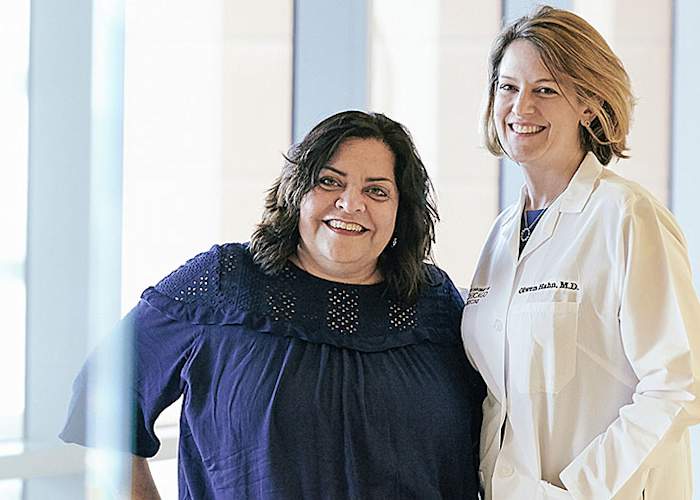
Living With Metastatic Breast Cancer
Dionna Koval shares her story with metastatic breast cancer and the search for a cure. Click to learn more.
What Causes Breast Cancer in the First Place?
Exactly what triggers breast cells to grow out of control isn’t well understood, but scientists do know that certain factors and habits can interfere with a cell’s instruction manual, aka its genes, according to the American Cancer Society. If something blocks its signal to stop dividing or messes with its ability to repair DNA damage, those abnormal cells will just keep on going.
每个人的风险是不同的,取决于多种因素,如遗传,家族史,生活方式等问题。但女性平均拥有约在她的生活中患乳腺癌的12%的机会。The average age of diagnosis is 62.
Here are some of the most common risk factors for breast cancer:
Family history:有一个近亲(母亲,父亲,姐妹),或谁已经有疾病可以使你的风险更高一些更遥远的亲戚。妇女与BRCA1或2突变在其一生中患乳腺癌的50%至85%的风险。通常情况下,这些基因有助于防止异常生长;但是当他们损坏,它很难为人体短路肿瘤的发展。
不是每个人都需要对这些突变进行测试,但那些与某些类型的家族病史的(例如,具有与乳腺癌两个第一亲属或一个,如果你有德系犹太人的遗产)应该。所以,在您下次的检查,询问你的医生,如果你要考虑基因筛查,以得到你患乳腺癌几率更好的手感。如果事实证明你确实有突变的一个,你就可以将工作与你的医生在一个计划,让那些风险数量下降。
Age:只是变老会增加开发的风险ing breast cancer, and most cases of this illness happen in people 50 years or older. Sometimes it takes decades of little gene mutations to accumulate before one finally tips the balance and triggers a tumor.
Hormones:Most breast cancers are fueled by estrogen and progesterone, so the longer a woman is exposed to reproductive hormones, the higher her risk of breast cancer. Women who started their periods before age 12 have about a 20% higher chance of developing breast cancer than someone who started after age 14. Hitting menopause after age 55 increases the odds by about 30% versus going through the change 10 years earlier. Taking combined estrogen and progesterone hormone therapy for menopause symptoms also increases risk (how much depends on how old you are and how long you took the medications). A history of using certain oral contraceptives for birth control is also linked to a very small (7%) increase in risk.
Body fat:Here's a little-know fact about fat: It produces estrogen. So the more you have, the higher your hormone levels tend to be. A study inJAMA Oncologyfound that in post-menopausal women, the risk of an estrogen-sensitive tumor was about twice as high in those with the highest percentage of body fat compared to the lowest. This was true even for women who had a “healthy” body-mass index.
醇:Look, you can still enjoy a cocktail now and then, but even moderate drinking (one to two drinks a day) may increase the risk of breast cancer by about a third to a half, according to a study inCurrent Breast Cancer Reports。
Family planning:Whether you have kids or not and at what age can affect your breast cancer risk by changing your levels of and exposure to hormones. A study in the国际癌症杂志found that women who never had children were were 1.3-times more likely to develop the disease… Women who had their first baby after age 35 were 1.4-times more likely to get breast cancer than those who had a kid before age 20. Try not to get too hung up on these numbers though: Is anyone recommending teen pregnancy to prevent breast cancer? Nope. The right time to have a baby is whenever you say it is—which may be never.
Do I Have the Symptoms of Breast Cancer?
Some breast cancers cause no obvious symptoms在所有这就是为什么定期乳腺X线检查是非常重要的。(美国癌症协会说,女性需要每年乳房X线照片开始在45岁,但应该有开始在40年筛选选项)虽然有时,这些肿瘤也让自己知道你,所以它有助于有什么样子的感觉对于。有以下任何症状并不一定意味着你有癌症。相反,考虑他们的信号打电话给你的医生:
肿块和肿胀:很多女性有自然乳房结块。You should take note of any lumps you feel or see in your breasts—but if both boobs have similar lumps in similar places, or they come and go with your menstrual cycle and are smooth and rubbery, they’re likely just cysts or other normal clumps of tissue. The lump to pay most attention to is one that’s new, only on one side, and doesn’t go away.
Another thing to know: Although tumors can feel squishy and smooth to the touch, cancerous lumps often have irregular edges and feel hard and immovable, like a pebble. Unexplained swelling of part or all of one breast should also be checked out. Sometimes more advanced breast cancers that have spread to the lymph nodes can also cause swelling, tenderness, or a mass in the armpit or by the collar bone.
Pain:许多妇女体验乳房胀痛很快就会和在月经周期的某段时间去,但新的疼痛,不走你的期间应签出。
乳头的改变:A newly retracted (or, sunken in) nipple is a symptom in some cancers. A tumor can cause inflammation and scarring that tugs that tissue inward. Same goes for sudden nipple discharge, especially fluid that’s bloody, in someone who isn’t breastfeeding or had a baby in the last year. And an eczema-like rash around the nipple can be a sign of Paget disease.
皮肤的变化:Redness, warmth, swelling, or dimpling could point to inflammatory breast cancer.
We've got all the details on breast cancer signs and symptoms. Click here to learn about it all.
Read MoreHow Do Doctors Diagnose Breast Cancer?
使用一些不同的工具,医生诊断乳腺癌,通常开始像一个乳房X线照片成像测试。
Imaging
- Mammogram:大多数妇女应该开始得到规则screeningmammograms in their 40s, although high-risk women may need to start earlier. These x-ray imaging tests look for masses or small white dots known as calcifications. If a doctor suspects breast cancer, they will order adiagnostic乳房X线照片以进一步探讨在乳房的任何变化。在诊断乳房X光检查,放射科医生会经常看图像立即,你需要等待,如果他们要采取额外的照片,或者他们会在一个地区使用尤其是“放大”的观点,真正零。
- 超声:Sometimes the doctor will want to get a different or more-detailed picture of your breast and will order an ultrasound or magnetic resonance imaging (MRI) to get more information about a suspicious lump or spot. Ultrasound is a great option for following up on a suspicious lump because the sound waves bounce back differently off a fluid-filled cyst versus a solid lump that’s more likely to be cancer.
- 磁共振成像(MRI):妇女谁是患乳腺癌的高风险有时需要一个MRI与他们定期乳房X线照片一起。这是因为核磁共振成像可以“看到”一些癌症是乳房X光检查会错过。这就是说,跳绳乳房专用,只是有一个MRI是不是一个好主意,因为MRI能错过其他癌症,将出现在乳房X光检查!
Biopsy
During a biopsy, the doctor will take a bit of fluid or tissue from the breast and test it for abnormalities. There are a couple different types of biopsies:
- Fine-needle aspiration:在这种最小侵入性的选项,一个医生将一个瘦小的,空心针入肿块移除一些细胞。(如果肿块是很难感觉或发现,医生有时会使用超声成像帮她知道在哪里的目标。)
- Excisional biopsy:Just like is sounds, this one is more like surgery. A doctor will cut out the suspicious lump entirely and test it—this is the most accurate way to diagnose, or rule out, cancer.
Pathology Tests
If a biopsy shows that a tumor is cancerous, doctors will run other tests to figure out what type of breast cancer it is. Many different tumor characteristics affect prognosis and treatment, including:
- Hormone status:Breast cancers that depend on estrogen or progesterone to grow are called hormone receptor-positive tumors. These cancers can be treated with hormone-therapy drugs and often have a better prognosis than other tumors, according to the American Cancer Society. A majority of breast cancers are hormone-receptor positive.
- HER2 status:HER2阳性乳腺癌过量产生HER / neu蛋白,这可以加速肿瘤的生长。这些谁试验阳性接收某些有针对性的药物治疗,可以阻止这些信号。
如果这两个激素受体和HER2测试呈阴性反应,乳腺癌被列为triple-negative。他们往往比其他类型的乳腺癌更积极,尽管专家们不知道是什么原因,也有较少的针对性的治疗。
什么是最好的治疗乳腺癌?
Most breast-cancer treatment includessurgical removal的肿瘤。但许多人需要更多的关心after that. The best combination of treatments for your breast cancer depends on the type and stage, and your own preferences. A lot of people consult with a team of different types of doctors including oncologists and breast surgeons before deciding what to do.
Surgery
- Lumpectomy:Just the tumor and some of the tissue around it is taken out. This can be a good option for people with cancers that are small, relative to the breast and are not multiple within the breast. Many patients with spread to nodes may also be candidates.
- Mastectomy:All the breast tissue (and sometimes the nipple and/or skin of the breast) is removed. It’s often recommended when there are several areas of cancer in the breast, or when the tumor is very large compared to the amount of healthy breast tissue.
- Lymphadenectomy:Removal of some or all of the lymph nodes under the arm. This may be required if the tumor has spread beyond the breast itself.
Medication
- Chemotherapy medicationsare used to kill or shrink cancer cells. Some tumors respond better to chemo than others—tests done on your specific cancer cells will help you and your doctor decide whether these drugs should be part of your treatment plan.Chemo is usually given as an IV infusionor injection at a clinic or doctor’s office. Doses are given in bursts—or cycles—of a few weeks at a time so that patients are able to rest and recover from each treatment before having another. The length of time a person will need chemotherapy treatments can vary, but it often lasts anywhere from three to six months.
- Hormonal therapiesare often used to treat hormone-positive cancers in order to cut off the supply of hormones the tumors need to grow and spread. These medications are usually taken for a long time—between five and 10 years.
- Other medications可以用来鼓励一个人自身的免疫系统来杀死癌细胞或靶向在一些癌症特异性蛋白质(如HER2阳性肿瘤)。而不是杀死癌细胞的方式,不化疗,靶向治疗通常不损害健康细胞一样多。靶向疗法可作为注射剂,输注IV,或药丸形式和一些可给予最多的一年。
Radiation
Very high-energy x-rays are delivered to the breast in order to wipe out cancer cells, shrink tumors, and/or help prevent breast cancer from growing back after surgery. Whether you need radiation depends on a lot of factors. If you have a lumpectomy instead of a mastectomy, for example, you will likely need radiation to zap any malignant cells that may have been left behind, lowering the chances that tumor will grow back. Some women will need radiation after mastectomy, as well.
辐射是对你整个乳房要么完成了,或只是其中肿瘤所在的部分。如果你的医生决定,你需要全乳照射,你会得到一个治疗五天,每周三到六周。如果你的乳房只有部分需要辐射,您通常需要一天一次或两次治疗三到五天。
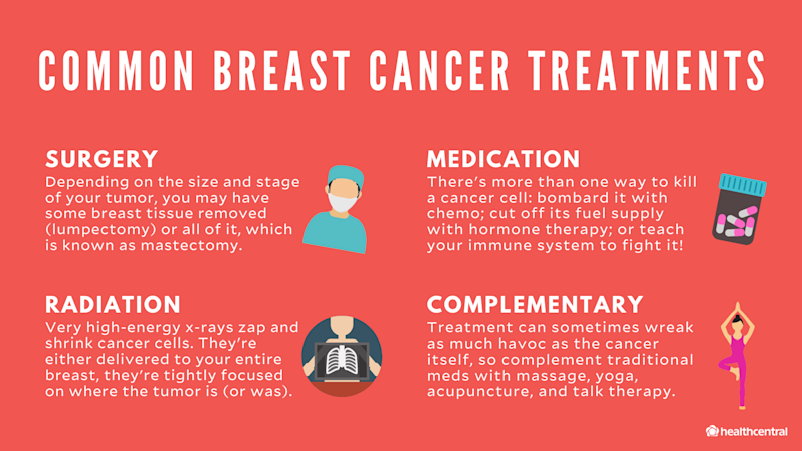
Other Types of Therapy That Can Help
There’s a reason people talk about the war against cancer: Because treatment turns your body into battleground. So when you’re going through it, do whatever you need to feel comforted, supported, and less stressed out. Massage, yoga, acupuncture, and/or plain old therapy can be the balm that protects you from any collateral damage.
Every case of breast cancer is different and so is every treatment plan. Learn more about what breast cancer treatment may be right for you.
Read MoreDoes Breast Cancer Treatment Cause Complications?
It can. Different treatments have different risks and side effects, but these are some of the most common ones, according to the CDC:
Surgery
- Pain
- Loss of sensation in the chest or remaining breast tissue
- A type of swelling called lymphedema. After having radiation therapy—or lymph nodes removed during surgery—lymph fluid can start building up in the arms, hands, breasts, or torso.
Chemotherapy
- Nausea
- Mouth sores
- Hair loss
- Higher risk of infections
- Reduced appetite and/or weight loss
- Brain fog or trouble with concentration and memory (often called “chemo brain”)
Hormone Therapy
- 头痛
- Mild nausea
- Hot flashes
- Vaginal dryness
- 阴道分泌物
- Hot flashes
- Night sweats
- Increased risk of blood clots
- Mood swings
Targeted Therapies
- 疲劳
- Hair loss
- Mouth sores
- Nausea
- 增加胆固醇或血糖
- Increased risk of infection
- Heart problems
Side effects of breast-cancer treatment can be pretty unpleasant, but these days, doctors have a lot of ways to help ease, from anti-nausea medications to ones that boost your immunity. Don't worry about putting up a brave front. If you're struggling with symptoms, let your doctors know so they can help you find some relief.
什么是生活像人们患乳腺癌?
Living day-to-day after being diagnosed with breast cancer can be full of fear and anxiety, plus pain or other really-not-fun side effects from treatment. You may also have to deal with people who don't understand the condition and can't fully grasp what you're going through. But here’s the good news: Because breast cancer is a relatively common illness and because there are so many excellent treatments, there are a lot of people who understand your situation and can help.
Take things one step at a time: Educate yourself about breast cancer, never be afraid to ask your medical team questions, and enlist the help of a friend or loved one to go to appointments with you. Breast-cancer treatment can be complex and the terminology confusing. It can be hard to keep everything straight when you are feeling unwell or are scared—your appointment buddy can take detailed notes and write down questions for you to ask next time.
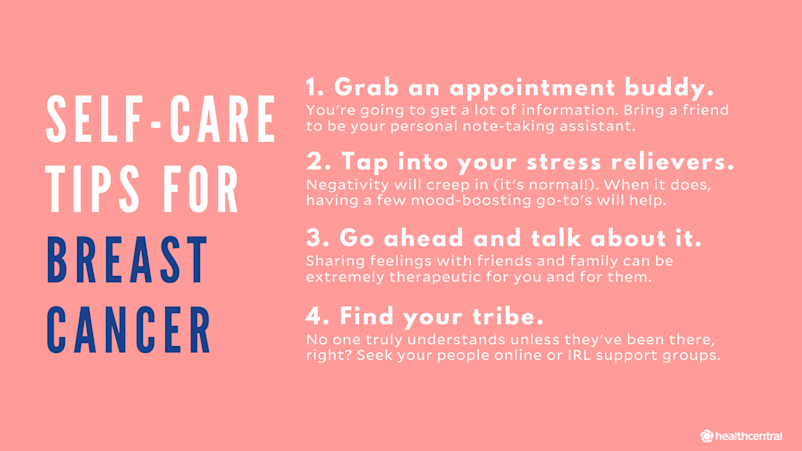
Emotional Health
This diagnosis can turn your life upside down. But you’re going to be making some of the most important decisions of your life over the next few months, and stress and depression can interfere with your healing process. Here’s how to fight back.
- Work stress-relief into your daily life. Negative emotions can impact your ability to make thoughtful decisions, as well as lead to stress that can suppress your immune system. So be sure to incorporate activities that help you quiet your mind such as meditation, deep breathing, exercise, journaling, or any other method that works for you.
- Speak up! Talking with friends and family about what you're going through can help you feel less alone. It’ll also give them a chance to offer support. And when they do, take it. If you’re too tired to cook, let them bring you dinner. If you want company at a chemotherapy treatment, let them drive you to the clinic and stay and chat during your infusion.
- Consider attending a support group or talking to a therapist. Being diagnosed with breast cancer is frightening—even if yours is caught early and you have a sunny prognosis. No one can understand exactly what you’re going through quite like someone who’s experienced it. Many larger hospitals and cancer centers have free support groups for patients. Try one out.
Sex Life
Cancer involves you in the fight of your life, and it’s often difficult to think about anything else, including sex. Plus, the way you feel about your body and how it looks can change a lot after lumpectomy or mastectomy surgery. Treatments like chemotherapy or hormone therapy can also interfere with sexual desire or function. But you don’t have to just sit back and take it. A good first step is to talk to your doctor. Most women deal with some sex-life changes and interruptions during or after breast-cancer treatment. Your doctor will not be surprised or embarrassed when you bring it up! And she can help: There are medications and other fixes she can recommend to help ease sexual side effects of medications; plus she can refer you to a support group for other breast-cancer survivors or to a counselor who is skilled at helping survivors ease back into their normal lives—orgasms included.
在哪里可以找到乳腺癌的社区?
There’s a lot of talk about breast cancer but finding and talking to people who know究竟what you’re going through can be just as important as finding a treatment plan that works. Here are some places to start to make connections, find resources, and meet friends.
Top Breast Cancer Bloggers/Instagrammers
- 布兰妮比德尔,@brittneybeadle
Follow because:Breast cancer does not rule her life—she continues to live life to the fullest, with just “a触摸的转移性乳腺癌“。有一天,她在化疗,第二天,她基本上是谁在海边住了一条美人鱼。
- Maggie Kudirka,@baldballerina,baldballerina.org/
Follow because:她从大舞台去为与Joffrey的一致行动集团在纽约芭蕾舞演员,对化疗IV期转移性乳腺癌的椅子。随着她的身后双乳切除术,她的战斗力和扣她的途中回到聚光灯下,一个plieat a time.
- Dayna DONO,@daynadono,anaono.com/
Follow because:There’sactuallya bra for that—and she’s the one to thank for it. She’s the founder and designer of AnaOno—a bra made specifically for women who have had breast-cancer reconstruction, breast surgery, mastectomy, or are living with other conditions that just don’t mix well with other bras.
- Umi Marie,@umi_kmarie
Follow because:Dancer, yogi, mom of three, and breast cancer warrior — these are just a few of her titles. But when we scroll her feed, we see: poet. Her words of gratitude and encourage are like mini-mantras to live your life by — and a lot of them stem from her survivorship.
- 贝丝仙童,@bethfairchild
Follow because:She’s fearless and fighting stage IV breast cancer. Her campaigns for breast-cancer awareness are fresh and spread like wildfire, and we totally encourage you to blaze that trail with her.
- Nalie Agustin,@nalieagustin
Follow because:Motivational YouTuber Nalie Agustin was diagnosed with stage IV breast cancer at just 24 years old. She vlogged all the way through her treatments on her channel and then startedThe Nalie Showthere, where she talks to fellow cancer survivors, celebrities, and other inspiring folks.
- Sabrina Skiles,@sabrinaskiles
Follow because:We might be biased since she’s aHealthCentral columnist, but we’re thinking — no, weknow— you’re going to adore her just as much as we do. Not that long ago she was a 30-something mom of two boys, following her husband across the country for his dream job, and celebrating a milestone birthday. That all changed overnight when she found a lump in her breast. Now she’s a beautifully mixed bag of mom-chemo-wig-wife-radiation-recovery-life. Her posts, like mini columns, will leave your heart either broken, fulfilled, or both, all at once. Oh, and she shares breast-cancer-friendly recipes, too! Told you she’s worth the follow.
- Bree Jordan,@cancerwontstopbree
Follow because:她的Insta生物说明了一切:她是“一个艰难的母亲,战斗乳腺癌和抚养一个孩子。”Without even reading her words (which will also suck you in), the pictures you’ll find while scrolling her feed are so powerful and will draw you in (like the one of her with a full head of hair looking over at herself, now bald #chills). You see the tough parts of chemo, but also how she fights to bounce back in life — like hopping on her cycle bike the day after her first chemo treatment.
- Jessica Boyd,@jessicaaboyd
Follow because:Just because she’s a few years out from her final round of chemo, doesn’t mean she stops fighting the hardest fight of her life against cancer returning. Especially when she has another reason to fight — for her miracle baby, conceived three years after finishing cancer treatments. Join her on the first of every month for a self-breast check (don’t worry, she’ll remind you), and on her fitness journey to stay strong so she can fend of metastatic breast cancer.
Top Breast Cancer Podcasts
- The Cancer Game Plan。该周报显示谈话到一个新的鼓舞人心的癌症战士每周对他们的旅程加上他们的“搞笑”瞬间癌症和癌症患者生活顶级技巧的主机。
- Investigating Breast Cancer。本届车展,从乳腺癌研究基金会,讨论了在该领域顶尖医生最新的乳腺癌的消息。
- 精简和直了尼克Austman。Two-time breast cancer survivor and certified life coach helps you juggle a Jekyll-and-Hyde life of depression and laughter—because the balance is real when you’re living with breast cancer.
- Cancer, Casually。The Fullest’s Managing Editor and breast-cancer survivor Lindsay DeLong brings on some notable and courageous guests to help thrivers keep thriving through other’s gut-wrenching or inspiring journeys. Walk away with a new perspective on the ‘Big C.’
- The Good Glow。After her breast cancer diagnosis, Georgie Crawford’s perspective on life completely changed. She needed a new outlook—one that brought her back to the basics of self-care and surrounding yourself with positivity. This listen will give you all the good vibes.
- 巨蟹座的营养师播客。Nothing says cancer care like good nutrition—they basically shove it down your throat (almost literally) during treatment. Julie Lanford, R.D., tells you exactly what you need to fuel your body, whether you’re in treatment, a survivor trying to avoid a recurrence, or you have a family history of breast cancer and are trying to stay ahead of the odds.
前乳腺癌支持团体和非营利组织
- Living Beyond Breast Cancer。Trustworthy information, community, and support for people with breast cancer and their friends and families—plus ongoing educational programs such as conferences and webinars. There’s also a free online/telephone helpline that will match patients with volunteers for one-on-one support and education.
- Young Survival Coalition。YSC尤其关注人在40岁under affected by breast cancer with free educational programs and guidebooks plus active discussion boards, a private Facebook group, and in-person meet-ups.
- Susan G. Komen Breast Cancer Foundation。One of the best-known breast-cancer advocacy organizations, Komen is a powerhouse fundraiser for breast-cancer research, and offers wide-ranging free services from an online treatment navigation tool to a breast care helpline and information on financial assistance.
- Metastatic Breast Cancer Network。以病人为主导的宣传组织,专注于独特的需求和生活转移性(或IV期)乳腺癌的人的关注。该MBCN提供的临床试验和治疗晚期乳腺癌,同伴支持小组和留言板,甚至资金的科研信息。
- The Breasties。它们使乳腺癌看起来酷。“自由撤退s, events, and community for women affected by breast and reproductive cancers.”
- Stupid Dumb Breast Cancer on Facebook。A community of women going throuhg breast cancer at all different stages. You will get an answer and support on anything you post. Sweet, genuine women wanting to pay it forward and support others.
经常问的问题乳腺癌
How do I check myself for breast cancer?
The best way is to get to know your breasts—how they feel, what they look like, and how they change during your menstrual cycle—and to let your doctor know about any concerning changes. The most common symptom of breast cancer is a lump. Other signs can include dimpled skin, pain or swelling in one breast that's not related to your period, skin inflammation, and unexpected nipple discharge.
What are the chances that I could develop breast cancer?
每个人的风险是不同的,取决于多种因素,如遗传,家族史,生活方式等问题。但女性平均拥有约在她的生活中患乳腺癌的12%的机会。诊断的年龄中位数为62;只有约5名妇女患乳腺癌%被确诊40岁以下。
什么是乳腺癌生存率?
Prognosis depends on several things including the stage of cancer, type of tumor, and what treatments are available. But on average, the five-year survival rate for invasive breast cancer is 90%. The 10-year survival rate is 83 percent. The 5-year survival rate for metastatic breast cancer (the type that has spread to other parts of the body) is 27%. But remember, the survival rate for the earliest forms of breast cancer is 99%.
男人得乳腺癌?
Yes. Any person ofany gender can get breast cancer, although women are 70 to 100 times more likely to develop the disease than men, according to the American Cancer Society. About 2,600 men are diagnosed each year.
- Breast cancer prevalence:美国癌症协会。(2019)。“癌症事实与数字2019”cancer.org/content/dam/cancer-org/research/cancer-facts-and-statistics/annual-cancer-facts-and-figures/2019/cancer-facts-and-figures-2019.pdf
- Stages of breast cancer:美国癌症协会。(2019)。“American Cancer Society Guidelines for the Early Detection of Cancer.”cancer.gov/about-cancer/diagnosis-staging/staging
- Estimates of DCIS cases that progress to cancer:Journal of Clinical Oncology (2018). “Comparison of operative to monitoring and endocrine therapy for low-risk DCIS (COMET study).”ascopubs.org/doi/abs/10.1200/JCO.2018.36.15_suppl.TPS599
- 第IV阶段癌症慢性疾病:美国癌症协会。(2019)。“Managing Cancer as a Chronic Illness.”cancer.org/treatment/survivorship-during-and-after-treatment/when-cancer-doesnt-go-away.html
- Who should be tested for BRCA mutations:UpToDate. (2019). “Recommendations from the United States Preventive Services Task Force on who should be offered genetic testing for BRCA mutations.”uptodate.com/contents/image?imageKey=ONC%2F57434
- 风险因素:疾病预防与控制中心。(2019)。“乳腺癌:有哪些风险因素?”cdc.gov/cancer/breast/basic_info/risk_factors.htm
- 在第一期和风险年龄:Susan G. Komen. (2019). “Age at First Period.”komen.org/BreastCancer/FirstPeriodOccursBeforeAge12.html
- Oral contraceptives and risk:National Cancer Institute. (2019). “Oral Contraceptives and Cancer Risk.”cancer.gov/about-cancer/causes-prevention/risk/hormones/oral-contraceptives-fact-sheet
- Body fat and risk:JAMA Oncology。(2018). “Body Fat and Risk of Breast Cancer in Postmenopausal Women with Normal Body Mass Index; A Secondary Analysis of the Women’s Health Initiative Randomized Clinical Trials and Observational Study.”ncbi.nlm.nih.gov/pmc/articles/PMC6439554/
- When to get a mammogram:美国癌症协会。(2019)。“American Cancer Society Guidelines for the Early Detection of Cancer.”cancer.org/healthy/find-cancer-early/cancer-screening-guidelines/american-cancer-society-guidelines-for-the-early-detection-of-cancer.html
- Symptoms of breast cancer:美国癌症协会。(2019)。“Breast Cancer Signs and Symptoms.”cancer.org/cancer/breast-cancer/about/breast-cancer-signs-and-symptoms.html
- Breast cancer treatment:National Cancer Institute. (2019). “Breast Cancer Treatment (Adult) (PDQ)—Patient Version.”cancer.gov/types/breast/patient/adult/breast-treatment-pdq#_222
- Side effects of treatment:疾病预防与控制中心。(2019)。“Side Effects of Cancer Treatment.“cdc.gov/cancer/survivors/patients/side-effects-of-treatment.htm


